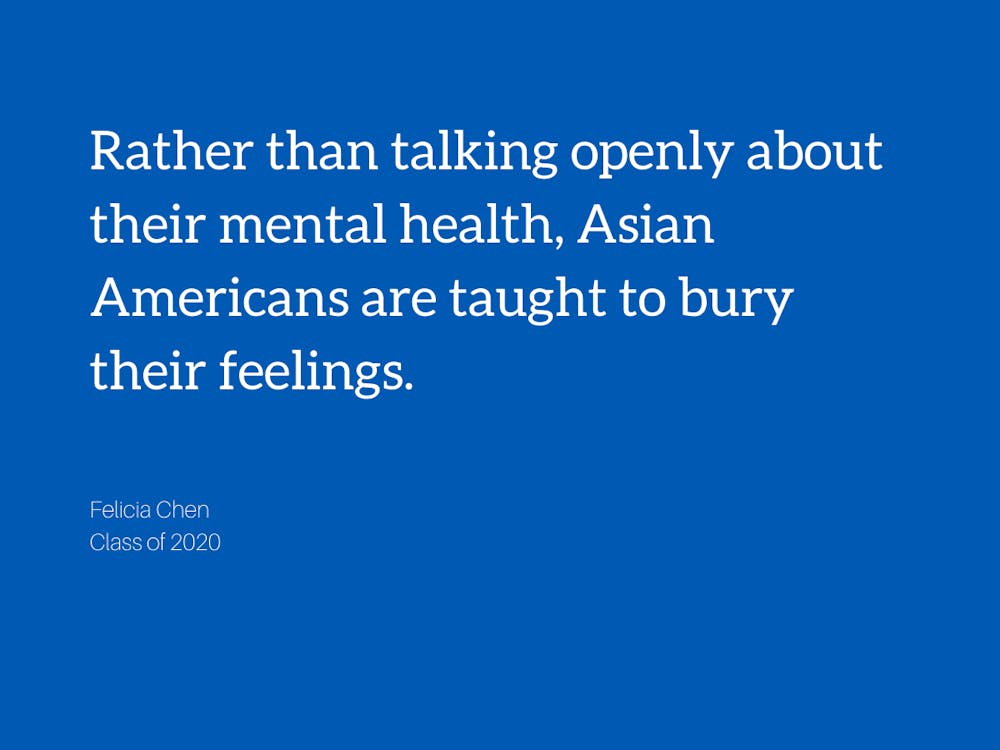Breathing is hard when it’s hard to breathe. Messy, loud, deep respirations as the lungs desperately hold onto whatever oxygen it can. Palpitations when the heart beats in overtime. A stabbing pain in the chest—and my mind trying to calm the symptoms: aren’t I too young to be having a heart attack?
“Don’t worry,” my mother said as she walked past me curled over in terror on the couch, “just get over it.”
I was clearly being overdramatic; after all, there was no obvious physical trauma. And so, she grabbed her keys and drove off, as I caved under the pressure beneath my ribcage. It wasn’t until a couple years later that I learned what I’d had: a panic attack.
Like many Asian immigrants, my parents are quick to dismiss any symptoms of intangible distress. Although mental health awareness in the United States has increased in recent years, many people still falsely believe that the symptoms are overblown. These misconceptions are alarming, especially when you look at the numbers.
One in five US adults experienced a mental illness last year—a staggering 20% of the population. This is equivalent to the number of people covered by Medicaid. It’s almost twice the population of California. We have the same proportion of Americans are 65-and-older.
Given the prevalence of mental health disorders, you’d think that there would be more encouragement to seek help. Sadly, less than half of those with a mental illness receive treatment. And for those who do, the average delay between their onset of symptoms and treatment is eleven years. In no other medical condition is there such a hesitancy in seeking treatment. Can you imagine waiting over a decade before seeing a dentist for a toothache?
Asian Americans, in particular, are more likely to suffer in silence. They’re three times less likely to seek out mental health services compared to white Americans. And when they do reach out, they can face hostility from their parents. Rather than listening to their feelings, parents may question why they can’t simply “feel better.”
After all, many immigrant parents had to overcome numerous hardships to succeed in the United States. How can you complain about your life here? Instead, you should be thankful for everything you have. From parents’ perspective, their children have little to complain about. Instead, they place high expectations on their kids, expecting them to appreciate the sacrifices that have been made.
And for the most part, Asian Americans do understand. Most are acutely aware of the relative comfort that they have compared to their parents. That’s what makes it difficult to reach out—leaving them feeling guilty or unsure of whether their own feelings are valid.
It is unfair to completely blame immigrant parents for their “just-get-over-it” mentality. A large part of the problem is rooted in cultural stigma. In many Asian countries, mental illness is deemed a weakness of character. It is associated with a failure on both the individual and the family. A person’s social standing is tied to the familial reputation; your actions are a reflection of your parents’ parenting.
When it comes to achievements such as getting into a top college, both the student and the parent are lauded. But having a child commit suicide is seen as a reflection of poor parenting; a failure on the family. After their son, Evan, killed himself, Katherine Tong talks about losing friends: "They just didn't want to associate with us, because they think this problem could rub off on their family." Many families therefore hide relatives with mental disorders as a shameful secret. They fear being isolated as others worry about “catching the disease” too.
As a result, in order to maintain social respect, Asian Americans are told to follow the unspoken rule of putting on a “good face." Rather than talking openly about their mental health, Asian Americans are taught to bury their feelings.
All of this makes it a long, challenging road for Asian Americans when it comes to seeking mental health treatment. Years of being taught otherwise is hard to overcome. Even just opening the door for conversation can be difficult. Efforts to promote mental health awareness in Asian communities through films and community workshops have been a good starting point. However, it remains an uphill battle to unlearn the lessons learned from our parents and culture.
Felicia Chen is a Trinity senior. Her column runs on alternate Wednesdays.
Get The Chronicle straight to your inbox
Signup for our weekly newsletter. Cancel at any time.

